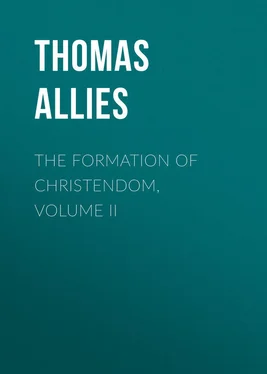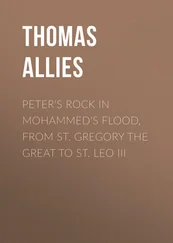Thomas Allies - The Formation of Christendom, Volume II
Здесь есть возможность читать онлайн «Thomas Allies - The Formation of Christendom, Volume II» — ознакомительный отрывок электронной книги совершенно бесплатно, а после прочтения отрывка купить полную версию. В некоторых случаях можно слушать аудио, скачать через торрент в формате fb2 и присутствует краткое содержание. Жанр: foreign_antique, foreign_prose, на английском языке. Описание произведения, (предисловие) а так же отзывы посетителей доступны на портале библиотеки ЛибКат.
- Название:The Formation of Christendom, Volume II
- Автор:
- Жанр:
- Год:неизвестен
- ISBN:нет данных
- Рейтинг книги:3 / 5. Голосов: 1
-
Избранное:Добавить в избранное
- Отзывы:
-
Ваша оценка:
- 60
- 1
- 2
- 3
- 4
- 5
The Formation of Christendom, Volume II: краткое содержание, описание и аннотация
Предлагаем к чтению аннотацию, описание, краткое содержание или предисловие (зависит от того, что написал сам автор книги «The Formation of Christendom, Volume II»). Если вы не нашли необходимую информацию о книге — напишите в комментариях, мы постараемся отыскать её.
The Formation of Christendom, Volume II — читать онлайн ознакомительный отрывок
Ниже представлен текст книги, разбитый по страницам. Система сохранения места последней прочитанной страницы, позволяет с удобством читать онлайн бесплатно книгу «The Formation of Christendom, Volume II», без необходимости каждый раз заново искать на чём Вы остановились. Поставьте закладку, и сможете в любой момент перейти на страницу, на которой закончили чтение.
Интервал:
Закладка:
But thirdly, as in that terrible corruption of heathenism, wherein immorality was based on false worship, we saw the body of Adam run out through time and space into the most afflicting form which evil can assume in the individual and social life of man, so in that Body which is ruled by the Divine Headship we see the counterpart, the triumph of grace, individual man taken out of that state of fallen nature, and invested with a membership answering to the dignity of the Head. The one great Christian people, the Kingdom of Christ, stands over against that kingdom of violence, disorder, impurity, and false worship. As there is a unity of the fallen Adam, a force of evil which impact only gives, so much more is there a unity of the Second Adam, which is not a collection of individuals, but a Body with its Head. The first unity consists in the reasonable soul, informing the flesh which was moulded once for all from the clay and descended to the whole race; and the race so descending was polluted by a common guilt, on which, as an ever-fertile root, grew the whole trunk of man's personal sins, of falsehood, enmity, corruption of morals, division, having the common quality of egotism. The second unity consists in the Holy Spirit of the Head communicated to the soul and body of the faithful people, both being restored by that grace of which truth and charity, unity and sanctity, are the tokens, the full virtue being planted in the cross of the Head, and from the cross diffusing itself to His Body.
II. And so we are brought again to Him who stood before Pilate to make the good confession, and who declared that the cause of His coming into the world was to bear witness to the truth. In what form was that witness to be made, and how was it to be efficacious? This is that point which we have now to illustrate. Adam's disobedience was a single act, the power of which, springing out of his headship, extended through the whole line of his race; through the consequences of this act the truth was obscured to them, and human life involved in manifold error. What was that action on the part of Christ, the purpose, as He declares, of His Incarnation, which had an equally enduring effect? If the guilt communicated was not transitory, then should the corresponding grace be perpetual. And how was it so? The Son of God, as the Head of His race, does not stand at disadvantage with Adam, but rather, we are told His grace is superabundant in its results over the other's sin: and He Himself declared that He had completely finished the work given Him to do. 60 60 John xvii. 4.
But here He describes this work to be the bearing witness to the truth. For, indeed, it was worthy of the eternal wisdom to clothe Himself in flesh 61 61 S. Thomas, Summa contra Gentiles , l. i. c. 1.
in order that truth, the good of the intellect, and the end of the whole universe, might stand forth revealed to His rational creatures: and He who made all things in truth would Himself restore truth, when it had been obscured by the traducer.
1. Let us take the character which He acknowledged and claimed before Pilate: His character of King, and the kingdom in which it is exercised.
The Person of Christ, as that of the eternal Word, is the Truth itself. But He has assumed a body, and in that body He declares that He is a king, and that the exercise of His royalty is the bearing witness to the truth. 62 62 John xviii. 37. “Thou sayest that I am a king. To this end was I born, and for this cause came I into the world, to bear witness unto the truth.”
His words therefore indicate no less than the creation of a kingdom to which the truth should be the principle of subsistence. But what in the material or temporal kingdom is that by force of which it subsists? Plainly power. A kingdom may be larger or smaller in population, wealth, extent, stronger or weaker in the quality of its people; but as long as it retains in itself that in which power culminates, sovereignty, it will be a kingdom. If this power departs from it, if it falls into subjection to a foreign authority, or if its own subjects successfully rebel against its power, it ceases to be. In the kingdom, therefore, of which Christ speaks, the maintenance of truth corresponds to what the maintenance of power is in a material kingdom.
But power in the material kingdom moves men to the natural end of society; it preserves order, administers justice, allows and assists all natural forces to develop themselves, and it must be in its supreme exercise one and indisputable: that is, it culminates in sovereignty. So in the spiritual kingdom truth, the corresponding power, moves men to the supernatural end, and truth culminates in infallibility. But where is this power seated, and how does the King wield it?
The same who here calls Himself King and declares it to be the function of His royalty to bear witness to the truth, in describing elsewhere the very creation of His kingdom says to His apostles, “You shall receive power by the Holy Ghost coming upon you,” bidding them also to remain in Jerusalem “until they were endued with power from on high.” 63 63 Acts i. 8; Luke xxiv. 49.
But a few hours before that scene in the hall of Pilate He had told them also that He would send them the Spirit of Truth, who should abide with them for ever, and should lead them into all truth. He creates therefore the kingdom of the truth by sending down the Spirit of the Truth to dwell for ever with those to whom He is sent; and this Spirit of the Truth is His own Spirit, whom He Himself will send as the token of His ascension and session; the Spirit who dwelt in the Body which He had assumed, and in which He spoke before Pilate, should be sent by Him when that Body had taken its place at the right hand of God, should invest with His own power those to whom He was sent, and should never cease to be with them in His character of the Spirit of Truth. Here, then, is that power in the kingdom of the Truth which enables it to bear a true and a perpetual witness. It is the power of the King, for it is His Spirit: it is the power of the kingdom, for it remains in it, is throned in it, and makes it to be what it is.
But to create a kingdom of the truth, and to bear perpetual witness in that kingdom to the truth, is not only to state what is true. These expressions mark out an organisation in and by means of which truth is perpetuated. And further, the spirit in man is both reason and will; and that man may act, the intellect which has truth for its object must work on the will which has good for its object. And so the witness which our Lord speaks of is that action of the truth upon the will which produces a life in accordance with it: it is truth not left to itself, but supported by grace. This power of the Spirit of Truth is therefore double, as intended to work on the two powers of the soul, the reason and the will: it is the double gift of Truth and Grace; as He is the Spirit of Grace no less than the Spirit of Truth, and all grace is His immediate gift.
Thus the Word made flesh being full of Truth and Grace from His own Person communicated that Truth and Grace as the power which should form His kingdom for ever, abide in it, and constitute its being a kingdom; the gift of truth and grace being the very presence of His own Spirit, who took possession of His kingdom on the day of Pentecost and holds it for ever.
This whole possession of Truth and Grace dwelling in a visible body is the work of the eternal Word, who assumed a body for that purpose. It is the counter-creation to the kingdom of falsehood which commenced with the sin of the first man believing a falsehood against his Maker, and which spread itself with his lineage into all lands. 64 64 See S. Aug. tom. iv. 1039 e. “Ipse ergo Adam,” &c.
And as in the natural creation He not only created but maintained – for He did not make His creatures and then depart from them, but from that time they exist in Him – so in the supernatural the act of maintaining is equivalent to the act of creating, it is a continued creation. As the guilt had a force which was fruitful, which continued and propagated itself, and produced a widespread reign of falsehood, how much more should that mighty and astonishing grace of a Divine Person assuming a created nature be fruitful, continue, and propagate itself in the maintenance of a visible kingdom, whose distinctive character and its very life should be the possession and communication of the truth. Should the Creator of man in His greatest work be less powerful than His seduced creature in his fall? and if the fall, pregnant with falsehood, bore fruit through ages in a whole race, should not the recovery likewise have its visible dominion, and stand over against the ruin as the kingdom of truth?
Интервал:
Закладка:
Похожие книги на «The Formation of Christendom, Volume II»
Представляем Вашему вниманию похожие книги на «The Formation of Christendom, Volume II» списком для выбора. Мы отобрали схожую по названию и смыслу литературу в надежде предоставить читателям больше вариантов отыскать новые, интересные, ещё непрочитанные произведения.
Обсуждение, отзывы о книге «The Formation of Christendom, Volume II» и просто собственные мнения читателей. Оставьте ваши комментарии, напишите, что Вы думаете о произведении, его смысле или главных героях. Укажите что конкретно понравилось, а что нет, и почему Вы так считаете.












